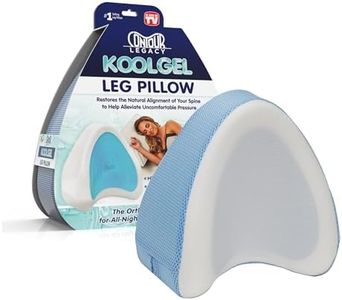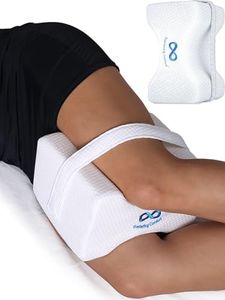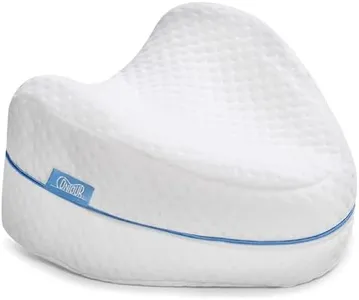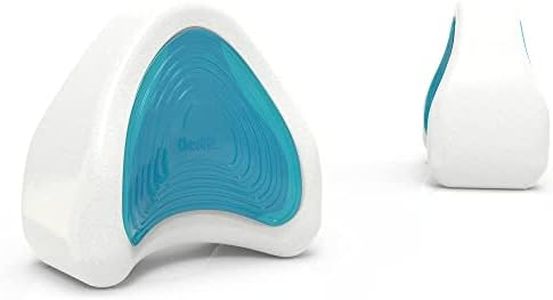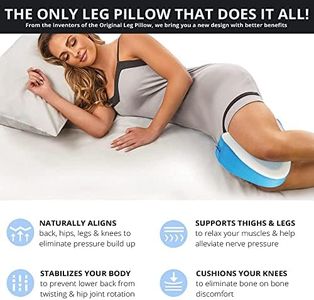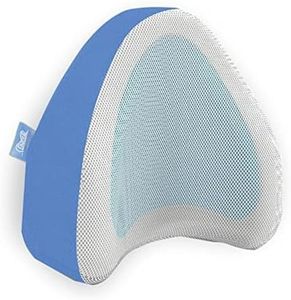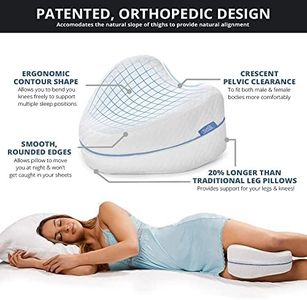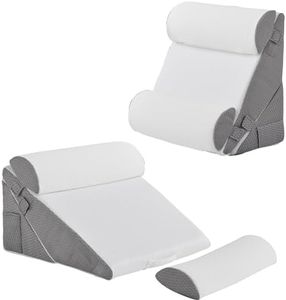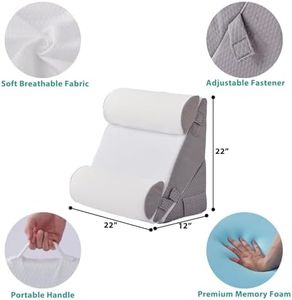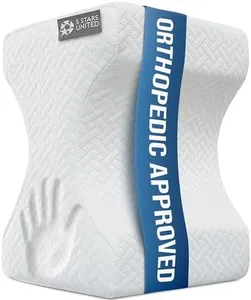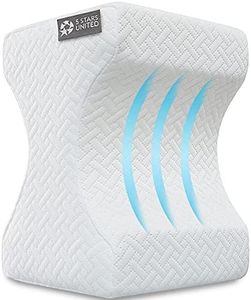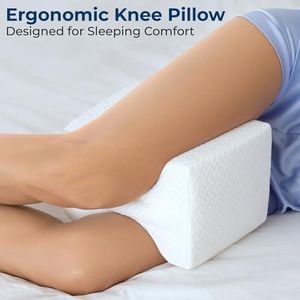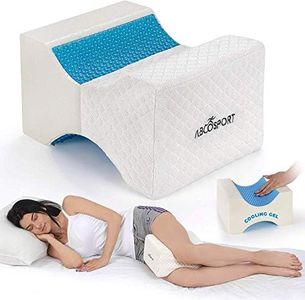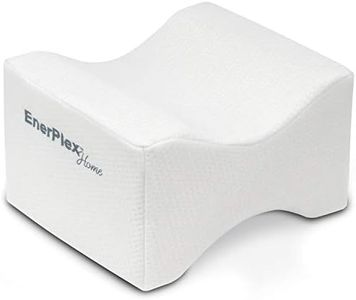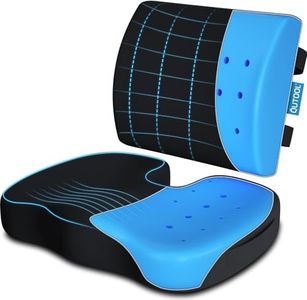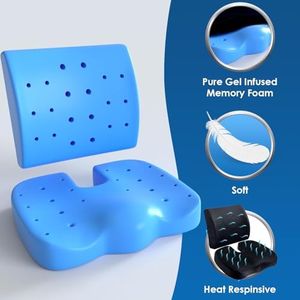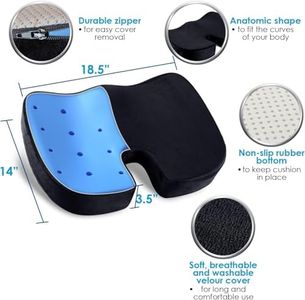10 Best Orthopedic Pillow For Hip Pain 2025 in the United States
Winner
Contour Legacy Cool Leg & Knee Foam Support Pillow for Side Sleepers Soothing Relief for Back, HIPS, Knees, Joints, Nerves & Muscles
The Contour Legacy Cool Leg & Knee Memory Foam Side Sleeper Support Pillow is designed to alleviate discomfort in the hips, back, knees, and joints, making it a suitable choice for side sleepers experiencing such issues. The pillow is made from memory foam, which is known for its ability to conform to the shape of your legs, providing personalized support. This material, combined with a gel layer and a 3D mesh breathable cover, helps keep you cool throughout the night, an essential feature for those who tend to overheat while sleeping.
Most important from
40882 reviews
Everlasting Comfort Memory Foam Leg & Knee Pillow for Side Sleepers - FSA/HSA Eligible Sciatica Pain Relief Leg Pillow for Side Sleeping - Adjustable Strap
The Everlasting Comfort Knee Pillow is designed primarily for side sleepers who suffer from hip and back pain. Made from high-quality memory foam, it provides a soft yet supportive feel that can help alleviate pain over time by improving alignment and reducing pressure on the hips and lower back. Its dual concave shape and adjustable strap ensure that the pillow stays in place throughout the night, which is excellent for maintaining comfort and support for side sleepers.
Contour Legacy Leg & Knee Foam Support Pillow for Side Sleepers Soothing Relief for Back, HIPS, Knees, Joints, Nerves & Muscles
The Contour Legacy Leg & Knee Foam Support Pillow is designed to provide relief for sciatica, back, hip, legs, knees, and joint pain, particularly for side sleepers. It is made from ventilated memory foam that promotes air circulation, helping to keep you cool throughout the night.
Most important from
40882 reviews
Top 10 Best Orthopedic Pillow For Hip Pain 2025 in the United States
Winner
10.0 score
Contour Legacy Cool Leg & Knee Foam Support Pillow for Side Sleepers Soothing Relief for Back, HIPS, Knees, Joints, Nerves & Muscles
Contour Legacy Cool Leg & Knee Foam Support Pillow for Side Sleepers Soothing Relief for Back, HIPS, Knees, Joints, Nerves & Muscles
Chosen by 1470 this week
Everlasting Comfort Memory Foam Leg & Knee Pillow for Side Sleepers - FSA/HSA Eligible Sciatica Pain Relief Leg Pillow for Side Sleeping - Adjustable Strap
Everlasting Comfort Memory Foam Leg & Knee Pillow for Side Sleepers - FSA/HSA Eligible Sciatica Pain Relief Leg Pillow for Side Sleeping - Adjustable Strap
Contour Legacy Leg & Knee Foam Support Pillow for Side Sleepers Soothing Relief for Back, HIPS, Knees, Joints, Nerves & Muscles
Contour Legacy Leg & Knee Foam Support Pillow for Side Sleepers Soothing Relief for Back, HIPS, Knees, Joints, Nerves & Muscles
Bedluxe Adjustable 4pcs Bed Wedge Pillow Set, Memory Foam Wedge Pillow Post Surgery for Back, Neck, Leg Pain Relief, Pillow Wedge for Sleeping, Sitting up in Bed, Acid Reflux and GERD, White/Grey
Bedluxe Adjustable 4pcs Bed Wedge Pillow Set, Memory Foam Wedge Pillow Post Surgery for Back, Neck, Leg Pain Relief, Pillow Wedge for Sleeping, Sitting up in Bed, Acid Reflux and GERD, White/Grey
5 STARS UNITED Knee Pillow for Side Sleepers - Hip Pain Relief, Memory Foam Leg Cushion for Side Sleeping - Between Legs Pillow for Sciatica & Lower Back Pain, White
5 STARS UNITED Knee Pillow for Side Sleepers - Hip Pain Relief, Memory Foam Leg Cushion for Side Sleeping - Between Legs Pillow for Sciatica & Lower Back Pain, White
6pcs Orthopedic Bed Wedge Pillow Set for Sleeping, Post Surgery Foam for Body, Back and Leg Pain Relief Comfortable & Adjustable Support Pillows-Anti Snoring, Heartburn, Acid Reflux & GERD Sleeping
6pcs Orthopedic Bed Wedge Pillow Set for Sleeping, Post Surgery Foam for Body, Back and Leg Pain Relief Comfortable & Adjustable Support Pillows-Anti Snoring, Heartburn, Acid Reflux & GERD Sleeping
Memory Foam Seat Cushion & Lumbar Support Pillow for Office Chair Car Wheelchair Orthopedic Chair Pad and Back Cushion with Adjustable Straps for Lower Back, Tailbone, Sciatica, Hip Pain Relief
Memory Foam Seat Cushion & Lumbar Support Pillow for Office Chair Car Wheelchair Orthopedic Chair Pad and Back Cushion with Adjustable Straps for Lower Back, Tailbone, Sciatica, Hip Pain Relief
Axelrod Orthopedic Bed Wedge Pillow Set, Post Surgery Foam for Back, Neck and Leg Pain Relief Comfortable & Adjustable Ortho Pillows- Anti Snoring, Heartburn, Acid Reflux & GERD Sleeping Dark Indigo
Axelrod Orthopedic Bed Wedge Pillow Set, Post Surgery Foam for Back, Neck and Leg Pain Relief Comfortable & Adjustable Ortho Pillows- Anti Snoring, Heartburn, Acid Reflux & GERD Sleeping Dark Indigo
Lunix 4pcs Orthopedic Bed Wedge Pillow Set, Post Surgery Memory Foam for Back, Knee, Leg Pain Relief, Adjustable Sitting Pillow for Sleeping, Acid Reflux, GERD, with Hot Cold Pack, Brown/White
Lunix 4pcs Orthopedic Bed Wedge Pillow Set, Post Surgery Memory Foam for Back, Knee, Leg Pain Relief, Adjustable Sitting Pillow for Sleeping, Acid Reflux, GERD, with Hot Cold Pack, Brown/White
8.6 score
Ahpmeoa 6PCS Orthopedic Bed Wedge Pillow Set for Sitting up in Bed, Memory Foam Post Surgery Pillow for Back Pain Relief, Back Support Pillow for Acid Reflux Relief, GERD, Anti Snoring (White)
Ahpmeoa 6PCS Orthopedic Bed Wedge Pillow Set for Sitting up in Bed, Memory Foam Post Surgery Pillow for Back Pain Relief, Back Support Pillow for Acid Reflux Relief, GERD, Anti Snoring (White)
Our technology thoroughly searches through the online shopping world, reviewing hundreds of sites. We then process and analyze this information, updating in real-time to bring you the latest top-rated products. This way, you always get the best and most current options available.

